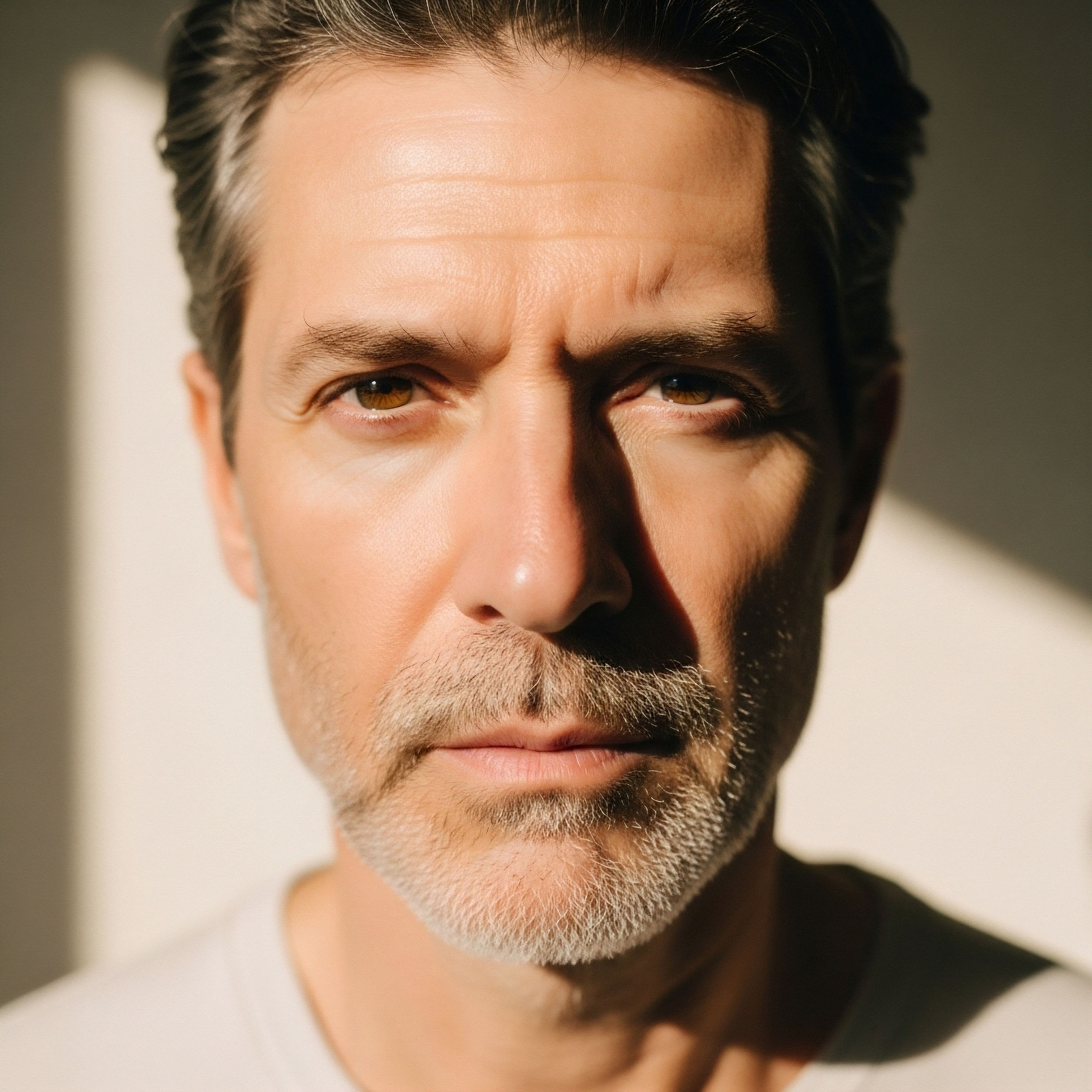

Fundamentals
Your body communicates through a complex and elegant language of chemical messengers. When you feel a persistent sense of fatigue, a shift in your mood that you cannot quite pinpoint, or notice changes in your body’s composition despite your best efforts, you are experiencing the direct results of this internal dialogue.
These experiences are valid, deeply personal, and often point to fluctuations within your endocrine system. Understanding the legal distinction between wellness coaching and medical advice is the first step in navigating your path toward reclaiming your vitality. This distinction is foundational to ensuring your journey is both safe and effective.
A medical doctor, particularly an endocrinologist, is trained to diagnose and treat disease. Their role is to identify specific pathological conditions through extensive diagnostic testing, interpret complex lab results, and prescribe therapeutic interventions such as Testosterone Replacement Therapy (TRT) or Growth Hormone Peptide Therapy.
This is the realm of medicine ∞ a structured, evidence-based system designed to correct physiological dysfunction and manage illness. A physician operates within a legally defined scope of practice, governed by state licensing boards and guided by rigorous standards of care. Their advice constitutes a medical directive, a plan designed to treat a diagnosed condition.
A physician’s role is to diagnose and treat disease, operating within a licensed and regulated framework.
Wellness coaching, conversely, occupies a different yet complementary space. A wellness coach acts as a facilitator for behavior change. They partner with you to build the daily habits and lifestyle modifications that create the foundation for optimal health. This process involves setting achievable goals, fostering accountability, and navigating the challenges of implementing new routines.
A coach does not diagnose conditions, interpret lab results with the intent to treat, or prescribe any form of therapy. Instead, they can help you understand and implement the plan given to you by your physician, offering support in areas like stress management, sleep hygiene, and nutrition ∞ all of which profoundly influence your hormonal landscape.

What Defines the Boundary between Coaching and Medicine?
The critical line separating these two professions is the act of diagnosing and treating. A physician can legally identify an illness and create a plan to manage it. A wellness coach who attempts to do so, even with the best intentions, is engaging in the unlicensed practice of medicine, which carries significant legal risks.
For instance, a coach can provide general information about the benefits of a balanced diet for hormonal health. They cannot, however, prescribe a specific diet to treat Polycystic Ovary Syndrome (PCOS). That action constitutes a medical intervention.
Think of it as the distinction between an architect and a construction manager. The architect (the physician) designs the blueprint for the building, specifying the materials and structural requirements necessary for a safe and functional edifice.
The construction manager (the wellness coach) then works with the client to manage the project, organize the timeline, and solve the practical problems that arise during the building process. Both are essential to the final outcome, yet their roles and legal responsibilities are distinct. The collaboration between an informed individual, a skilled physician, and a supportive coach creates the most robust structure for achieving and sustaining profound well-being.


Intermediate
To appreciate the functional gap between wellness coaching and medical advice, we must examine the concept of “scope of practice.” This legal doctrine defines the procedures, actions, and processes that a licensed professional is permitted to undertake. For a physician, this scope is broad, encompassing the full range of diagnostic and therapeutic activities.
For a wellness coach, the scope is intentionally circumscribed to focus on education, motivation, and behavioral support. The integrity of this boundary is what protects you, the individual seeking guidance.
A physician’s interaction is clinical. It involves taking a detailed medical history, conducting a physical examination, ordering and interpreting laboratory tests, and formulating a diagnosis. When a man presents with symptoms of andropause, a physician can order a comprehensive hormonal panel.
Upon reviewing the results and finding low testosterone levels, the doctor can legally diagnose hypogonadism and prescribe a protocol that may include Testosterone Cypionate, Gonadorelin, and an aromatase inhibitor like Anastrozole. Each element of this protocol is a medical decision, a prescription tailored to alter the patient’s physiology in a specific, measurable way.

How Do Clinical Protocols Illustrate This Distinction?
The clinical protocols used in hormonal optimization provide a clear illustration of the medical scope of practice. These are not lifestyle suggestions; they are precise pharmacological interventions.
- Male Hormone Optimization A physician may initiate Testosterone Replacement Therapy (TRT). This involves prescribing a controlled substance and managing its potential side effects through ancillary medications. A wellness coach, in contrast, can support this patient by helping him develop a consistent schedule for his injections, create a workout routine that complements the therapy, and manage stress levels that could otherwise impact the protocol’s effectiveness. The coach supports the implementation of the medical plan.
- Female Hormone Balance For a woman in perimenopause, a physician might prescribe low-dose Testosterone Cypionate and Progesterone. This decision is based on a complex evaluation of symptoms, lab results, and personal health history. A wellness coach cannot suggest this course of action. The coach can, however, provide evidence-based information on lifestyle adjustments that support hormonal balance, such as dietary strategies to manage blood sugar or techniques to improve sleep quality, which are foundational to well-being during this transition.
- Peptide Therapy The prescription of peptides like Sermorelin or Ipamorelin/CJC-1295 for anti-aging and metabolic health is another medical act. These substances signal the pituitary gland to produce more growth hormone. A physician determines the appropriateness of this therapy. A coach can help the client track their progress, note subjective improvements in sleep or recovery, and maintain the lifestyle habits that will maximize the benefits of the therapy.
Wellness coaching focuses on the behavioral and lifestyle factors that support a medical protocol, without prescribing the protocol itself.
The following table delineates the distinct responsibilities within the context of hormonal health:
| Area of Focus | Medical Doctor’s Role (Licensed Practice) | Wellness Coach’s Role (Non-Licensed Support) |
|---|---|---|
| Initial Assessment | Conducts medical history, physical exam, orders and interprets lab tests. | Discusses client’s wellness vision, goals, and challenges. |
| Diagnosis | Identifies and names specific medical conditions (e.g. hypogonadism, insulin resistance). | Does not diagnose. Refers client to a physician for any suspected medical issues. |
| Intervention | Prescribes medications (e.g. TRT, peptides), creates treatment plans. | Provides education, facilitates goal-setting, promotes behavior change. |
| Nutrition | May prescribe a specific diet to treat a medical condition (e.g. a ketogenic diet for epilepsy). | Offers general nutritional information from recognized authorities, helps with meal planning. |
| Accountability | Monitors clinical outcomes and adjusts treatment based on follow-up labs and patient feedback. | Provides support and accountability for achieving self-directed lifestyle goals. |
This division of labor is designed for safety and efficacy. The physician manages the biological hardware, making precise adjustments to the endocrine system. The coach helps you upgrade the operating system ∞ the daily practices and mindsets that allow that hardware to function optimally. One provides the map; the other helps you navigate the terrain.


Academic
The demarcation between wellness coaching and medical advice is legally constructed to mitigate the inherent risks of informational asymmetry and potential harm. From a legal and ethical standpoint, the core issue is liability arising from the unlicensed practice of medicine.
This is a statutory offense in every state, designed to protect the public from individuals who lack the requisite education, training, and licensure to provide medical care. When a wellness coach crosses this line, they assume a level of liability for which they are neither insured nor qualified, potentially leading to severe legal consequences.
The legal doctrine of “duty of care” is central to this distinction. A licensed physician has a legally recognized duty of care to their patients. This duty is established the moment a doctor-patient relationship is formed, and it requires the physician to adhere to the accepted standard of care for their specialty.
A breach of this duty that results in harm can lead to a medical malpractice lawsuit. Wellness coaches, lacking a license, do not have the same legally defined duty of care. Their liability typically falls under general negligence principles. If a coach provides advice that could be construed as medical and it leads to harm, they could be found negligent for acting outside their scope of competence.

What Are the Legal Ramifications of Exceeding Scope?
Exceeding the scope of practice for a wellness coach can trigger a cascade of legal actions. The most significant is prosecution for the unlicensed practice of medicine. State medical boards are tasked with enforcing these statutes, and penalties can range from cease-and-desist orders to fines and even imprisonment.
Furthermore, a coach’s professional liability insurance will almost certainly contain an exclusion for any activities that constitute the practice of medicine. This means that if a client sues them for harm caused by advice that crossed the line, the coach would be personally responsible for all legal fees and any subsequent judgment.
The legal framework prioritizes public safety by strictly regulating who is authorized to diagnose and treat medical conditions.
To illustrate the nuances, consider the application of these principles in the context of hormonal health. A client might show their wellness coach a copy of their lab results. The following table breaks down the permissible and impermissible actions:
| Scenario | Permissible Action by Wellness Coach | Impermissible Action (Unlicensed Practice of Medicine) |
|---|---|---|
| Reviewing Lab Results | Can ask the client how their doctor interpreted the results and what the doctor’s plan is. Can help the client formulate questions to ask their doctor. | Cannot interpret the lab values for the client or suggest that a particular value indicates a specific medical condition. |
| Discussing Supplements | Can provide general, publicly available information about a supplement from a reputable source. | Cannot recommend a specific supplement or dosage to treat a symptom or alter a lab value. |
| Addressing Symptoms | Can acknowledge the client’s reported symptoms and help them track their frequency and severity to report back to their doctor. | Cannot link the symptoms to a likely diagnosis or suggest a course of action intended to treat the underlying cause. |
The legal system is designed to create a bright-line rule ∞ diagnosis and treatment are the exclusive domain of licensed medical professionals. This is because a single lab value or symptom, viewed in isolation, can be misleading.
A physician is trained to synthesize a vast array of data points ∞ from the patient’s history and physical exam to multiple lab markers and imaging studies ∞ to arrive at a differential diagnosis. A wellness coach, lacking this comprehensive training, risks causing harm by oversimplifying complex clinical pictures. The legal distinction, therefore, is a necessary safeguard, ensuring that individuals receive guidance from professionals operating within their designated areas of expertise.
- Duty of Care A physician’s duty is established by the doctor-patient relationship and is legally enforceable. A coach’s duty is based on general principles of negligence.
- Standard of Care Physicians are held to a standard of care defined by the medical community. Coaches are held to the standard of a reasonable person with similar training.
- Liability A physician’s liability is covered by medical malpractice insurance. A coach’s liability insurance will not cover the unlicensed practice of medicine.

References
- Cohen, Michael H. “Legal Issues in Health Coaching.” Cohen Healthcare Law Group, 2022.
- National Board for Health & Wellness Coaching. “Scope of Practice.” NBHWC, 2023.
- Huffman, Melinda. “Advancing the practice of health coaching ∞ Differentiation from wellness coaching.” Journal of Workplace Health & Safety, vol. 64, no. 9, 2016, pp. 400-403.
- Ryan, Richard M. and Edward L. Deci. “Self-Determination Theory and the Facilitation of Intrinsic Motivation, Social Development, and Well-Being.” American Psychologist, vol. 55, no. 1, 2000, pp. 68-78.
- Amato, A. A. & Levine, J. B. “The Unlicensed Practice of Medicine ∞ A Legal and Ethical Quagmire.” Journal of Medical Regulation, vol. 102, no. 2, 2016, pp. 7-14.

Reflection

Where Does Your Personal Health Authority Begin?
You have now explored the essential framework that separates medical treatment from wellness coaching. This knowledge is a tool, a means to build a team of qualified experts who can guide you effectively. Your body is the ultimate authority, the source of the data that drives this entire process.
The sensations, symptoms, and shifts you experience are real and significant. The path forward involves honoring that internal wisdom while engaging with professionals who respect their own legal and ethical boundaries. Your journey is one of partnership ∞ with your physician, potentially with a coach, but most importantly, with yourself. The power lies in understanding these roles so you can orchestrate your own return to optimal function.



